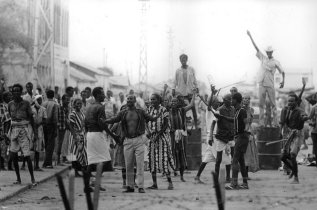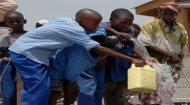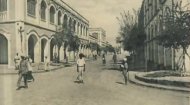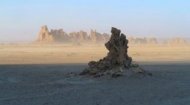|
Djibouti Independence |
Djibouti Independence |
Djibouti Independence | Djibouti Independence |
Explore all about the small nation of Djibouti on the east of Africa in pictures, videos and images.
More >
 |

The new party campaigned for independence and secured a 99% vote for it in a third referendum with Hassan Gouled Aptidon becoming prime minister. France then granted full independence on 27th June 1977 as the Republique de Djibouti with Gouled Aptidon as president. On 12th June 1981 Gouled was re-elected into that role with 84% of the vole, however he was the only candidate and Djibouti then became a one party state with opposition parties banned. Gouled Aptidon continued as president until 1999 and his rule was to see a stark decline in Djibouti's fortunes with the economy shrinking by some 40%. In his latter years his nephew, Ismail Omar Guelleh (above), manoeuvred for control and, following Gouled's retirement in 1999, was selected as party president winning the 1999 election with 80% of the vote. He remains in office to this day having wond the last election in 2021 with 97.30% of the vote after an opposition boycott. |
 In response to this and following his visit, de Gaulle appointed Louis Saget as Governor General on 21st September 1966 and a further referendum was held to establish the future of the country. When it was held in March 1967 60% voted to remain as part of France and, in July that year, the name of the region was changed to Territoire Francais des Afars et des Issas (the French Territory of Afars and Issas.) The Governor General post was also changed to that of High Commissioner. It should be noted that prior to the referendum 10,000 Somalis were deported from the country with the reason given that they did not have valid identity cards and the result itself was split along ethic lines with the Somali population with its sub-clan of Issas generally supporting independence with a view to joining a united Somalia while the Afar population wanted to remain with France. Interestingly at the time, Djibouti had a population of 58,240 Somali and 48,270 Afar however only 14,689 Somali were allowed to register to vote against 22,004 Afar. There were also suggestions that the French had extended the vote to many Afar living as nomads in Ethiopia. Following the outcome of the referendum there was rioting with the French military killing eleven Issa protestors (below).
In response to this and following his visit, de Gaulle appointed Louis Saget as Governor General on 21st September 1966 and a further referendum was held to establish the future of the country. When it was held in March 1967 60% voted to remain as part of France and, in July that year, the name of the region was changed to Territoire Francais des Afars et des Issas (the French Territory of Afars and Issas.) The Governor General post was also changed to that of High Commissioner. It should be noted that prior to the referendum 10,000 Somalis were deported from the country with the reason given that they did not have valid identity cards and the result itself was split along ethic lines with the Somali population with its sub-clan of Issas generally supporting independence with a view to joining a united Somalia while the Afar population wanted to remain with France. Interestingly at the time, Djibouti had a population of 58,240 Somali and 48,270 Afar however only 14,689 Somali were allowed to register to vote against 22,004 Afar. There were also suggestions that the French had extended the vote to many Afar living as nomads in Ethiopia. Following the outcome of the referendum there was rioting with the French military killing eleven Issa protestors (below).



 Demands for independence continued and gained momentum during 1974-1975 as many nomadic Issas crossed into the country fleeing a severe drought in Somalia at that time. As such, many observers concluded that if a third referendum were to be held, France would be unlikely to achieve its preferred outcome and others doubted France could even sustain the cost of running the country. By 1972 Hassan Gouled Aptidon (left) , a pro independence Issa nationalist politician, had became leader of the Issa based Union Populaire Africaine (UPA, African People's Union) and three years later formed the country's first multi-ethnic political party, Ligue Populaire Africane pour l'Indepenuance (LPAI, African People's League for the Independence) when the UPA merged with the Afar led Ligue pour l'avenir et l'ordre (LAO, League for the Future and Order).
Demands for independence continued and gained momentum during 1974-1975 as many nomadic Issas crossed into the country fleeing a severe drought in Somalia at that time. As such, many observers concluded that if a third referendum were to be held, France would be unlikely to achieve its preferred outcome and others doubted France could even sustain the cost of running the country. By 1972 Hassan Gouled Aptidon (left) , a pro independence Issa nationalist politician, had became leader of the Issa based Union Populaire Africaine (UPA, African People's Union) and three years later formed the country's first multi-ethnic political party, Ligue Populaire Africane pour l'Indepenuance (LPAI, African People's League for the Independence) when the UPA merged with the Afar led Ligue pour l'avenir et l'ordre (LAO, League for the Future and Order). 


